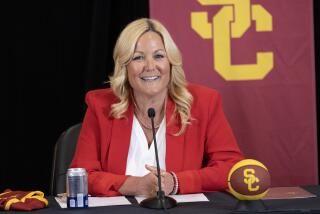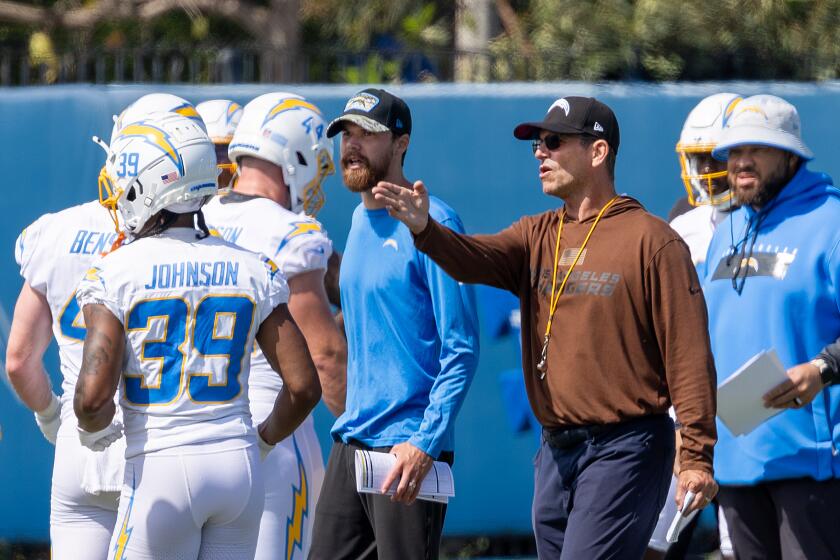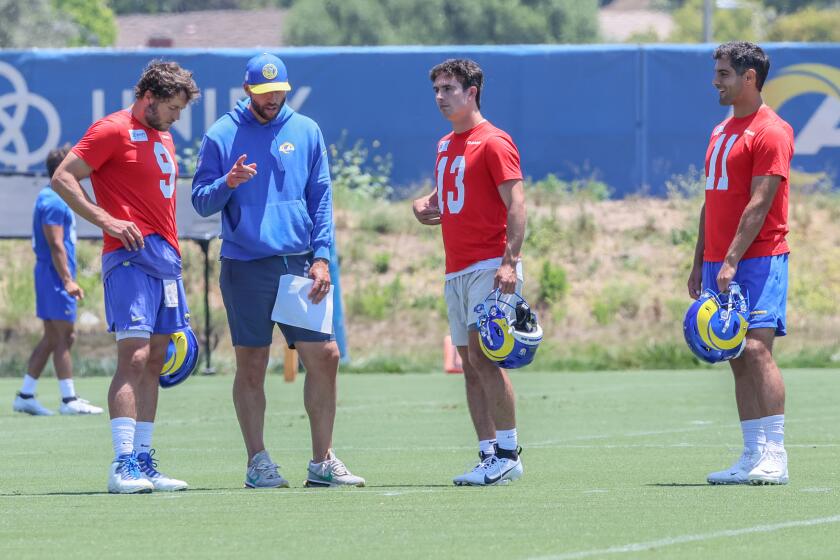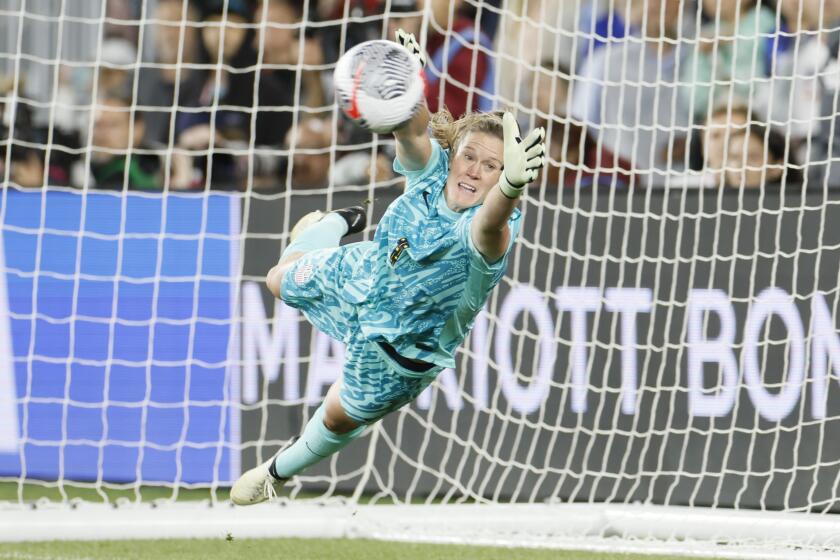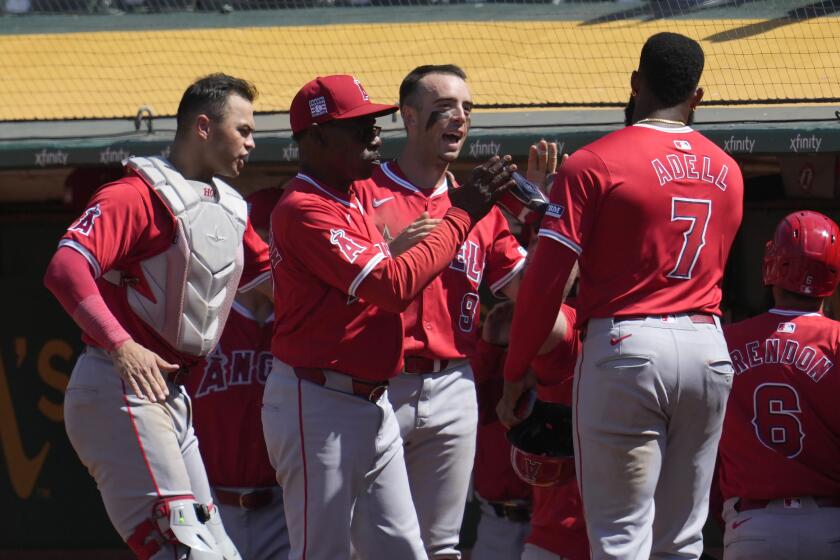Coaching Rivalry Gets a Foothold : Sockers: Newman, Jago have plenty of history, negative feelings between them.
Ron Newman doesn’t want to say anything negative about his old friend Gordon Jago, but Newman won’t hide his disappointment over how he feels Jago kept him from being named Coach of the Year.
Likewise, Jago doesn’t want to say anything negative about his old friend Ron Newman, but he isn’t happy that his Coach of the Year ballot was made public, and he figures Newman is to blame.
This is the way they stoke a rivalry in the Major Soccer League, which re-enacts an ancient duel tonight (7:35 at the Sports Arena) with Newman’s Sockers taking on Jago’s Dallas Sidekicks in the best-of-seven championship series.
It is an old feud, indeed. It was Jago who coached the Tampa Bay Rowdies and Newman who coached the Sockers in the 1982 North American Soccer League indoor championship series. Jago doesn’t talk about that series any more--it was a long time ago, he points out. But Newman recalls it as the first link in what has grown into a chain of nine championships in the past 10 years.
The rivalry even predates that series. In the mid-1970s, Newman coached the NASL’s Ft. Lauderdale Strikers and Jago was beginning his tenure with the Rowdies.
“We used to go at it back then for the bragging rights of Florida,” Jago remembered.
By then, Newman and Jago already had crossed paths.
“When I first got here in 1969,” Newman said. “I was coaching Dallas and Gordon was coaching Baltimore.”
Talk about trading places. Not only did Jago end up in Dallas, but the Baltimore franchise ended up in San Diego as the Sockers.
Enough history--current events have added fire to the competition between these two Englishmen.
The choice for Coach of the Year--which is voted on by the league’s seven coaches--came down to the ballots cast by Newman and Jago. Newman left himself off his ballot, but put Jago first. Jago wrote in Wichita’s Roy Turner first, St. Louis’ Fernando Clavijo second, then Newman.
With five points accompanying first-place votes, three for second and one for third, Jago finished with 24 total points. Newman finished two points--or the difference between a third- and a second-place vote--behind at 22.
The Sockers saw Jago’s ballot as a riddle: Turner’s Wings, after all, finished in sixth place (18-22).
“In my opinion there is no justification (to vote for Turner),” said Erich Geyer, Newman’s assistant coach, who found it even more onerous that Jago gave his second-place vote to Clavijo, an assistant most of the season who took over the Storm with eight games remaining. The Storm went 5-3 the rest of the way, but could not crawl out of last place.
Jago had ready answers to criticism of his ballot.
“I don’t think this should have been made common knowledge,” Jago said. “But since it has been, I’ll explain my picks. I chose Roy Turner for two reasons. One, he had turned around his program and he had done so in a very commendable fashion. It’s not easy to attract good players to Wichita and keep them there, and at the time of the vote (April 1, one week remaining in the season), it looked like Wichita would finish second or third. Two, Ron had won it once, and I had won it once, and I felt Roy was deserving of it. I voted for the person I thought did the best job according to the people he had and the material he had to work with.
“As far as Fernando, I didn’t place him ahead of Ron, I placed him third, but again, he turned a program around. They (the Storm) were a different team over night after he took over.”
In the league’s news release, Clavijo is listed as receiving only one second-place vote. And according to Geyer, who was made privy to the final tally, Clavijo was second on Jago’s ballot.
When asked about the discrepancy, Jago simply said, “I know who I voted for.”
Geyer said he knows, too.
“He just put in Roy Turner and Fernando Clavijo to take points away from Ron,” Geyer said. “It’s a joke, an absolute joke. People are driven more by their egos than their objective knowledge of soccer. How can he ignore a regular-season championship by a team that had to rebuild because it lost (six) players? If you rebuild and win the whole thing, and then don’t get credit for that, then something is damn wrong. Damn wrong. Something is wrong with the system and wrong with the people who voted. There’s no question about that.”
Among the players who left the Sockers were Branko Segota, the league’s second all-time leading scorer and still only 29; Waad Hirmez, the team’s leading goal-scorer last season (43); Glenn Carbonara, the unsung hero of the championship series; and midfielder Rod Castro.
In addition, two holdovers, forward Paul Wright and midfielder Brian Quinn, did not sign contracts until after the first game, and Quinn, considered the league’s top playmaker, left midway through the season to fulfill obligations with the U.S. national team.
Jago--who took the Sidekicks from last-place in 1990-91 to second this season--said his ego did not alter his vote.
“First of all, I couldn’t care less about individual awards,” he said. “It’s idiotic to single out individuals in team sports. If anyone makes the assertion that selfishness entered my vote, then they don’t know me. If Erich Geyer is upset, let him tell me.”
Still, the Sockers aren’t buying that explanation.
“If one person wants to manipulate the vote, he can,” Newman said. “One of the seven of us can make a drastic change.
“Maybe it’s good that this has come to a head. I’ve threatened many times not to vote in the past, but next year I’ll carry through with that threat. I’ve campaigned for a long time that coaches should not vote for coaches.”
Tonight the two coaches will take their positions on the team benches. Their votes will not matter, their rebuilding efforts will. In the next four to seven games, Jago’s and Newman’s players will decide the team of the year.
And Newman is hoping his players will vindicate him.
Forget Coach of the Year, he said, “I’d rather win another championship.”
About the Finals
* Season series: The Sockers won the regular-season series, 4-3. Each team won all its home games.
* At the Arena: In regular-season history, the Sidekicks are 1-23 at the Sports Arena and have lost 18 in a row. A record so dismal that in the Sockers’ pregame media notes, it mentions that in the playoffs, the Sidekicks “have won an impressive two of seven” games at the Sports Arena. No sarcasm was intended.
* Old friends: Dallas Coach Gordon Jago coached the Tampa Bay Rowdies, and forward Tatu and defender Wes McLeod played for that team in 1981-82, the season the Sockers began their string of nine championships in 10 years by defeating the Rowdies in the old North American Soccer League championship series.
* Key ingredients: Only Sockers Coach Ron Newman and assistant coach Erich Geyer were with the 1982 Sockers club. Geyer was a defender.
* Broken string: During the Sockers string of championships, the Sidekicks are the only other team to have won an MSL title while the Sockers were members of the league. They did so in 1987 by defeating the Tacoma Stars four games to three. The Stars gained the championship series berth by defeating the Sockers in the Western Division Finals, four games to three.
SOCKERS AT A GLANCE
2 DAVID BANKS: Defender Banks spent the season trying to live up to his Rookie of the Year billing, but instead suffered through a sophomore jinx. Midway through the semifinals series against the Blast, he decided to start anew. He recorded only one block, but was instrumental in silencing the Blast’s leading scorers Dominic Mobilio and Rusty Troy. 3 PAUL WRIGHT: Forward Wright led the MSL in scoring for much of the season, but tailed off at the end when opponents realized he negated his speed advantage by refusing to shoot with his left foot. Defenders began over-playing Wright the other way, and he ended up third in the league with 50 goals, 10 of which came against the Sidekicks. 4 PAUL DOUGHERTY: Midfielder Dougherty stands 5 feet 2 and weighs 140 pounds, but often asserts himself as if he were Hulk Hogan. No one’s spared when Dougherty decides it’s time to win. He’ll go at it with opponents, goalies, referees, teammates and coaches--the other guys’ and his own. His intensity was integral to the Sockers’ easy victory over Baltimore in the semifinals. 5 ALEX GOLOVNIA: Defender For much of the season Golovnia, a former outdoor player in the Soviet first division, appeared as if he were still uncomfortable with the indoor game despite having a season under his belt. But since the midway point, Golovnia has been one of the Sockers’ most consistent defenders. 8 JIMMY McGEOUGH: Defender McGeough was signed to replace Brian Quinn when the midfielder left for the U.S. national team late in January. After suffering an injury in his first practice, McGeough could not play until March 24 when he took the place of the injured Ben Collins. The defense was expected to suffer with the loss of Collins, but if anything, McGeough strengthened it. 9 SCOTT GERAGHTY: Midfielder Geraghty signed as a developmental player at the beginning of the season and, like other developmental players of past seasons, patiently awaited an opportunity to play. Unlike former developmental players, Geraghty’s chance actually came. He made enough of an impression that he suited up for the final three semifinal games. 12 KEVIN CROW: Defender Crow enhanced his reputation a year ago when he was credited with teaching a new corps of defenders the correct way to play indoor soccer. They went on to become the MSL’s top-rated defense. In the recent semifinals, Crow played on two sprained ankles and managed to bully Blast forward Jean Harbor enough to make him a nonfactor over the final three games. 16 BEN COLLINS: Defender In mid-March Collins underwent surgery on his left knee and had to miss the last seven games of the season and the semifinals. The preliminary diagnosis said Collins wouldn’t be ready until next season, but don’t be surprised to see him suited up for tonight’s championship series opener. He has been practicing the past couple weeks and the knee has held up. 17 TIM WITTMAN: Midfielder Wittman was held without a goal against the Baltimore Blast, his team of 10 years, in the semifinals. Not that he cared much--his new team advanced to the championship series and now Wittman has he best opportunity of his career to earn a championship ring. 18 TERRY WOODBERRY: Defender After the way Woodberry squelched the Baltimore offense over the last three games of the semifinals, you would think the Sockers at least would distribute a new mug shot and throw away this one which has been recycled the past two seasons and depicts Woodberry in an old hair style. Woodberry hates it: “It looks like I have a bird nest on my head.” 19 JACQUES LADOUCEUR: Midfielder Ladouceur might be a good choice for unsung hero. While several of his teammates put up big, flashy numbers, Ladouceur gets things done quietly. He scored the game-winning goal in Game 4 of the semifinals and had a goal and an assist in Game 3. During the season, he established career highs in goals (17), assists (13) and points (30). 21 THOMPSON USIYAN: Forward As the season progressed, Usiyan’s first-year teammates began finding the big forward where he had been all season--in the corner boards waiting for a pass. He began receiving those passes in bunches during the semifinals and started setting up the Sockers’ offense from there. He finished with seven assists, most on the team. 24 WES WADE: Forward A defensive runner throughout his three-year career, it appeared Wade never would move up from that position--he was simply too valuable harassing opponents into giving up the ball. But when Coach Ron Newman wanted to shake up his offense during the semifinals, he made his defensive runner a forward. Wade responded with three goals and an assist. 25 JOHN KERR: Forward Kerr was the one who lost out when Wade began taking full shifts at forward. A Paul Dougherty type who often scores by being in the right place at the right time, Kerr’s luck had gone bad. After scoring seven goals in his first eight games, Kerr scored only five more the rest of the season. 27 VICTOR NOGUEIRA: Goalie The league’s MVP for two years running, Nogueira spent the season demonstrating a deftness to cut off the shooter’s angle and denying the goal. But during the semifinals cutting the angle wasn’t enough and Nogueira had to prove he could also make the leaping, acrobatic save. Because he could, the Sockers begin their quest for a 10th championship tonight.
SIDEKICKS AT A GLANCE
3 TROY SNYDER: Defender Snyder is one of several solid defenders on the Dallas roster who picked up the pace in the playoffs as the Sidekicks adjusted to the loss of goalie Joe Papaleo, out with knee ligament and cartilage damage. Snyder finished the series against Cleveland with 11 blocks. He had 76 during the season--fifth most in the league. 4 MIKE UREMOVICH: Defender Uremovich, a nine-year MSL veteran, finished the season fourth on the team with 64 blocks, then came through with nine more in the first three games of the semifinals. Uremovich, who had not missed a game all season, sat out the final three of the semis with a strained abdominal muscle. He remains questionable for tonight. 5 MIKE POWERS: Defender Powers’ 75 blocks during the regular season ranked him sixth in the league. Notice any sort of trend here? 76, 64, 75 . . . Either the Sidekicks have the strongest defense in the league, or those accusations that Dallas stat keepers are the league’s most generous in the blocks department have some basis in truth. 6 JAN GOOSSENS: Forward One of Coach Gordon Jago’s key off-season acquisitions, Goossens played in only 29 regular-season games, but nevertheless finished seventh in the league with 33 assists. He also scored 19 goals. Goossens came through this season as the compliment to Tatu that the Sidekicks for so long have lacked. 7 RODERICK SCOTT: Forward Scott has been unable to emerge from the shadow of Tatu in his three seasons in the MSL, all with the Sidekicks. In 29 games this season, he scored 15 goals, only one of which came in the team’s seven games against the Sockers. He will not draw a lot of attention from Sockers defenders during the series. 8 WES McLEOD: Defender And you thought we had already gone over the Dallas defenders. Nope--most discussions of the Dallas defense begin with McLeod, the Sidekicks’ version of Kevin Crow. He led the league in blocks this season with 91--nine more than Crow. He has spent all but 27 games of his eight-year career with the Sidekicks and is fifth all-time with 652 blocks. 9 TATU: Forward Tatu is fourth on the all-time goal-scoring list with 406. But don’t expect to find any other Sidekick listed. Tatu--with his propensity to dribble through crowds of defenders instead of sneaking a pass away--was a one-man show. Not any more. This season Tatu’s 47 goals didn’t even lead the Sidekicks--and he passed for 41 assists. 10 KEVIN SMITH: Midfielder Smith emerged from a career of mediocrity the past two seasons to add variety to Dallas’ offense. Smith scored 55 goals over the past two years, seven more than he managed the previous four seasons combined. He had nine points against the Sockers this season (four goals, five assists). He also registered four goals and passed for eight assists in the semifinals. 11 DAVID DOYLE: Forward After the league solidified this past summer and Sockers Coach Ron Newman realized nearly all his goal scorers had abandoned the team, he set out to sign Doyle. Maybe he liked the alliteration, but Doyle wound up in Dallas (actually, he probably liked the bigger contract). Doyle went on to lead the Sidekicks with 51 goals. 12 JEFF AGOOS: Defender Agoos, Dallas’ first-round selection in the 1991 MSL entry draft, emerged as one of the MSL’s rare draftees to make a roster. Not only that, but Agoos actually contributed. In 30 games, he blocked 21 shots, scored seven goals and assisted on eight others. The rookie played in all six semifinal games. 14 RICHARD CHINAPOO: Defender Chinapoo is yet another Dallas defender who piled up big numbers in the blocked-shots column. He finished with 55. But Chinapoo does more than stifle the other guys. He also makes runs into the attacking zone. Like the Sockers’ Paul Dougherty, Chinapoo is a streak scorer. He scored 23 goals during the season, nine of which came in three hat tricks. 17 DAVID PFEIL: Midfielder Don’t expect to see Pfeil much during the championship series. The rookie played sparingly in the regular season and suited up only once during the semifinals. Perhaps his most significant statistic, or at least the one that explains his presence on the roster, is his birthplace: Dallas. 19 HANK HENRY: Goalie Henry is responsible for the Sidekicks tightening up their defense during the semifinals. But it wasn’t as if Henry instilled confidence. It was more like he instilled fear: Henry finished the regular season with a 1-7 record and a 6.86 goals-against average. He was pressed into action when regular goalie Joe Papaleo tore up his knee in the season’s next-to-last game. 23 NICK STAVROU: Midfielder Stavrou, another of Dallas’ four rookies, suited up more often than the other three, playing in 36 games. His statistics: four goals, six assists, 34 blocks--a good rookie season by MSL standards. The most striking difference between the Sidekicks’ and Sockers’ roster is the number of rookies. The Sockers have none on their regular roster. 44 BETO: Midfielder Beto uses one name like Tatu, he hails from Brazil like Tatu, but he doesn’t score like Tatu. While Tatu pummeled the Sockers for eight goals and four assists during the regular season, Beto scored only one goal and set up two others. In Dallas’ semifinal series, Beto kicked in two goals and assisted on another.
More to Read
Go beyond the scoreboard
Get the latest on L.A.'s teams in the daily Sports Report newsletter.
You may occasionally receive promotional content from the Los Angeles Times.

